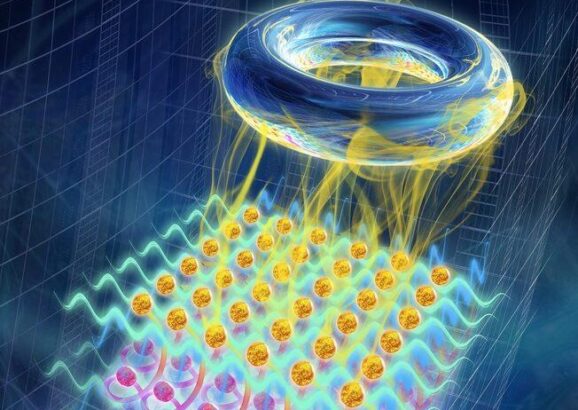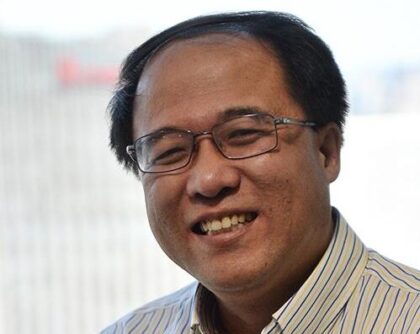Xiao-Gang Wen
Research Interests
- Theory of Strongly Correlated Electronic Systems
- Theory of Topological Order and Quantum Order
- Theory of High Temperature Superconductors
- Origin and Unification of Elementary Particles (such as light and electrons)
- Theory of Quantum Hall Effect and Non-Abelian Statistics
Prof. Wen’s main research area is condensed matter theory. He introduced the notion of topological order and quantum order to describe a new class of matter states. This opens up a new research direction in condensed matter physics. He found that states with topological order contain non-trivial boundary excitations and developed chiral Luttinger theory for the boundary states. The boundary states can become ideal conduction channel which may leads to device application of topological phases. He also proposed a special class of topological order: non-Abelian quantum Hall states. They contain emergent particles with non-Abelian statistics which generalizes the well known Bose and Fermi statistics. Non-Abelian particles may allow us to perform fault tolerant quantum computations. He found that string-net condensations can give rise to a large class of topological orders. In particular, string-net condensation provides a unified origin of photons, electrons, and other elementary particles. It unifies two fundamental phenomena: gauge interactions and Fermi statistics. He also proposed the SU(2) gauge theory of high temperature superconductors.
Biographical Sketch
Xiao-Gang Wen received a BS in physics from University of Science and Technology of China in 1982 and a Ph.D. in physics from Princeton University in 1987.
He studied superstring theory under theoretical physicist Edward Witten at Princeton University. Wen later switched his research field to condensed matter physics while working with theoretical physicists Robert Schrieffer, Frank Wilczek, Anthony Zee in Institute for Theoretical Physics, UC Santa Barbara (1987-1989).
He became a five-year member of IAS at Princeton in 1989 and joint MIT in 1991. Wen is a Cecil and Ida Green Professor of Physics at MIT (2004-present), a Distinguished Moore Scholar at Caltech (2006), and a Distinguished Research Chair at Perimeter Institute (2009). Among other honors, Wen is a Sloan Foundation Fellow (1992); APS Fellow (2002), Isaac Newton Chair at the Perimeter Institute for Theoretical Physics (2011), co-winner of the Oliver E. Buckley Condensed Matter Physics Prize (2017) “for theories of topological order and its consequences in a broad range of physical systems“, and was elected to National Academy of Science (2018) in recognition of “distinguished and continuing achievements in original research.”
Courtesy of Int’l Centre for Theoretical Physics | YouTube

Ultra-Quantum Matter research gets $8 million boost
MIT’s Senthil Todadri and Xiao-Gang Wen will study highly entangled quantum matter in a collaboration supported by the Simons Foundation.
Awards & Honors
- 2018 // Dirac Medal (ICTP) (co-recipient with Subir Sachdev and Dam Thanh Son) "for their independent contributions towards understanding novel phases in strongly interacting many-body systems, introducing original transdisciplinary techniques."
- 2018 // National Academy of Sciences Member
- 2017 // Oliver E. Buckley Condensed Matter Physics Prize (APS) (co-winner) "for theories of topological order and its consequences in a broad range of physical systems."
- 2011 // Isaac Newton Chair, Perimeter Institute for Theoretical Physics
- 2009 // MIT School of Science Prize for Excellence in Undergraduate Teaching
- 2004 // Cecil and Ida B. Green Professor of Physics
- 2002 // American Physical Society Fellow (APS) "For fundamental contributions to the physics of the fractional quantum Hall effect, and for novel insights into quantum magnetism and high temperature superconductivity."
- 1993 // Sloan Research Fellowship
Key Publications
-
Classification of Gapped Symmetric Phases in 1D Spin Systems
Xie Chen, Zheng-Cheng Gu, Xiao-Gang Wen
arXiv:1008.3745
(Classified gapped symmetric phases for 1D qubit systems through local unitary transformations and the projective representations of the symmetry group.) -
Local unitary transformation, long-range quantum entanglement, wave function renormalization, and topological order
Xie Chen, Zheng-Cheng Gu, Xiao-Gang Wen
arXiv:1004.3835
(Introduced the notion of long-range quantum entanglement through local unitary transformation. Long-range quantum entanglement is the essence of topological order and quantum order.) -
A lattice bosonic model as a quantum theory of gravity
Zheng-Cheng Gu and Xiao-Gang Wen
gr-qc/0606100
(Constructed a quantum qubit model on a lattice which gives rise to emergent gravitons.)
